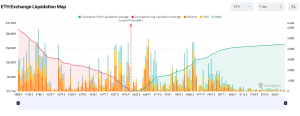Israel Investment Fund Group Announces Multibillion BTC Investment

The Israel Investment Fund Group (IIFG) has announced they have invested a whopping $2.3 billion in bitcoin (BTC).
The venture capital firm, based between Tel Aviv and Beverley Hills, California, shared a tweet on July 9, stating, “As part of Portfolio’s diversification policy, we have invested 2.3 billion in Bitcoin. It is part of a global strategy to lead Israel to the future of the currency.”
IIFG particularly invests in Israeli startups, early-stage companies, and tech assets. However, the private investment firm also manages Israel’s sovereign wealth fund.
Israeli forces seize Hamas crypto accounts
The IIFG’s multibillion-dollar investment comes amid reports that Israeli security forces have begun targeting and seizing cryptocurrency accounts used by the Palestinian Hamas group.
These reports indicate that the Israeli Ministry of Defense uncovered a network of wallets containing BTC and other cryptocurrencies. They alleged that Hamas were using cryptocurrencies to raise funds for their military wing.
Testing begins on digital shekel
An ever-increasing number of countries are looking into the idea of central bank digital currencies (CBDCs). Some are further along than others. Many are still in the research stage, while others have already been recognized in legislation, such as in Ukraine. Others still, such as front runner China, is in the midst of its pilot program. At the time of the last update, issued back in May, Chinese private bank Zhejiang E-Commerce Bank had added itself to the pilot. Joining the ranks of six state-owned institutions, as well as online grocery services and food delivery units.
At the end of June, Israel also joined the list of nations that had entered the testing phase of their CBDC. Andrew Abir, the Deputy Governor of the Bank of Israel, accidentally announced a pilot test of the digital shekel at a conference.
Deputy Governor Abir clarified shortly afterwards that he was not totally convinced about the CBDC. He referred to his previous estimation that “the chance of having a CBDC within five years is 20%.”
Even so, he said he was more optimistic than before, citing other countries’ activities regarding CBDCs as the reason. However, Abir still believes there is “less than a 50% chance” that Israel will have a digital shekel in five years.
Disclaimer
All the information contained on our website is published in good faith and for general information purposes only. Any action the reader takes upon the information found on our website is strictly at their own risk.












